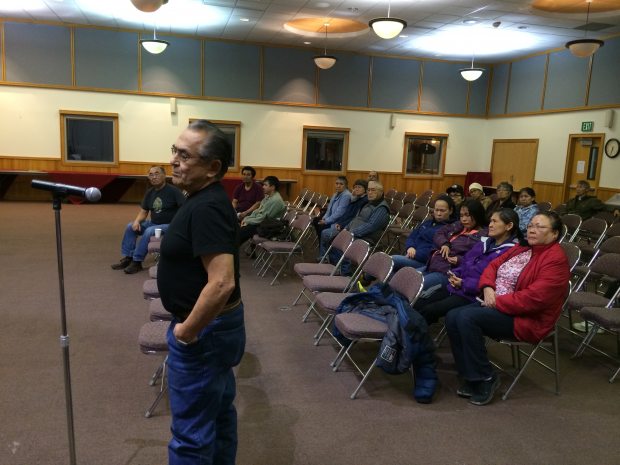Alaska Native corp. to vote on whether to enroll descendants as shareholders

(Lisa Demer / ADN)
BETHEL — A proposal to open up membership in a Western Alaska regional Native corporation to children and grandchildren of shareholders is raising questions about what it would mean for one of the poorest parts of the state.
Calista Corp., the regional corporation for Bethel and 55 surrounding villages, is asking its nearly 13,000 shareholders whether they want to issue new stock to descendants — children, grandchildren and great-grandchildren. The vote, which will happen next year, comes at the request of tribal members and follows two advisory votes in support of opening up membership.
If Calista members vote yes, they dilute the value of their own shares and increase overhead costs for a Native corporation that has yet to pay out significant dividends.
But if they vote no, they are — at least for now — cutting the younger generations out of the chance to be shareholders and have a voice in a Native-run company that has seen revenue grow 33-fold in 14 years.
Calista Corp. leaders have been touring the region presenting the proposal to shareholders and answering questions. They’ve been to Tununak and Kasigluk, Kipnuk and Crooked Creek, with more village trips planned. They outlined the plan last month in Anchorage. Calista’s website includes videos in both English and Yup’ik explaining the proposal.
Officially, the corporation and its board are neutral, Calista board Chairman Willie Kasayulie told an audience in Bethel on Wednesday evening.
“We are neither for or against the proposal because it is the shareholders who will be deciding on it,” Kasayulie told about 25 people gathered at the Yupiit Piciryarait Cultural Center in Bethel.
Calista is one of the 12 regional Alaska Native corporations created under the 1971 Alaska Native Claims Settlement Act, or ANCSA. The federal law, which advanced construction of the trans-Alaska oil pipeline, settled aboriginal land claims in exchange for title to 44 million acres and nearly $1 billion.
It took an act of Congress to allow descendants to enroll. Since that 1988 change, at least five other regional corporations already have made the shift to open up their shareholder pools.
“It’s really this dynamic point in time within all of our regional corporations,” said Liz Medicine Crow, who is from Kake in Southeast Alaska. She was born just days after the December 1971 cutoff for enrollment of original shareholders and gained her Sealaska shares later. The youngest of the originals are now 42 years old, yet there’s an expectation that the ability to make decisions about Native lands and businesses should be stewarded through generations, she said.
“In 50 years, the companies that have not included the younger generation, what will their corporate ownership look like?” she said.
Calista now has 12,900 shareholders, about one-fourth of whom received shares through gifts or inheritance. Those born by the December 1971 cutoff are aging and their numbers are dropping. More and more are moving out of Bethel and surrounding villages.
Time to expand?
Calista leaders say their for-profit corporation is finally on firm enough footing to consider expanding shareholder enrollment.
Just this month, it issued the first dividend from investments in its own mini-permanent fund, the Akilista Fund, which amounted to $122 for a shareholder with 100 shares. Earlier this year, its board approved the largest dividend in Calista history, $350 for someone with 100 shares.
But other Alaska Native corporations, with richer resources, have sent out much heftier dividends, with payouts sometimes amounting to tens of thousands of dollars per stockholder.
“I can see the big money-making Native organizations doing this,” Stanley Hoffman, part of the expansive Hoffman clan with a fish camp upriver near Napaimute, said at the Bethel shareholder meeting on the upcoming vote. “I can’t see Calista doing it.”
Calista’s 6.5 million acres of land holdings are largely undeveloped. Its region stretches across an area bigger than the state of New York, but much of the land is federal. Villages selected lands mainly to preserve access to traditional fishing and hunting grounds.
It makes more sense to pass along shares as Calista’s tribal members have been doing all along, through gifts and inheritance, Hoffman said.
At that, some in the audience, made up mainly of current shareholders, clapped.
Hoffman, retired after more than four decades with the Federal Aviation Administration, said later that Calista’s dividends may be small, but they make a difference in a region with few jobs. His oldest son is an original shareholder but the younger three received stock after his wife died and her shares were divided among them, he said.
“When I die, my kids are going to get my shares,” he said. “It’s an ongoing thing.”
A bigger voice
Poverty and unemployment in the region — except for the hub of Bethel — are among the highest in the nation, according to an October 2013 state Labor Department report.
If the resolution passes, Calista leaders expect the number of shareholders to triple.
A pot of revenues now divided among fewer than 13,000 people would be spread among 38,000 to 43,000, the corporation says.
That means dividends could be cut by two-thirds.
Think of the total dividend pool like a bowl of akutaq, or Eskimo ice cream, at a party, Calista explained in a list of frequently asked questions.
“If there are five party guests, they can each have quite a bit of akutaq,” the company said. “However, if there are 15 party guests, each guest will receive a much smaller portion because they are sharing the akutaq with many more guests.”
Over the years, Calista has distributed $29 million to its shareholders, counting special benefits for elders. More than half of the payouts have been since 2012. But split among what’s already a large group, individuals have received about $2,000 each, all told.
Some want to open up enrollment to ensure their children and grandchildren are taken care of — but also to give them a voice in Calista. Only shareholders are allowed to vote on corporation business, including selecting the board of directors.
“It’s more than the money. … It would allow the corporation to grow,” Gertrude Peter of Bethel said. “And they probably would realize how many more people they are serving and hopefully do more for the people.”
Her seven children, including four still in Bethel, were all born after the December 1971 cutoff. One may be enrolled in a village corporation through her father, but none are yet Calista stock owners, Peters said.
While dividends may be smaller, everyone in the family, including children, will get one, Margaret Pohjola, a Calista board member originally from Chuathbaluk, told the Bethel audience.
Passing along shares through inheritance, rather than by issuing new stock, dilutes their power, too, Medicine Crow said. An elder may split 100 shares among five children, who then divide their 20 shares among their own children.
Growing revenues
Calista hasn’t established itself as a significant economic driver in the region, though leaders say that is changing.
The corporation sees big promise in the Donlin Gold mining project near Crooked Creek, on land for which Calista holds subsurface rights.
Its headquarters — like that of many of the Native corporations — is in Anchorage, with 60 people working out of a new building off C Street partly owned by Calista.
Just one person works in its Bethel corporate office, tucked around the side of a small office complex in Bethel’s town center.
Andrew Guy, Calista president and chief executive since 2010, has a long-term plan to build a headquarters in Bethel, said Calista’s spokesman, Thom Leonard.
The corporation has advocated politically for issues important to tribal members, and one of its subsidiaries, STG Inc., now is working on projects in the region, Kasayulie, the board chairman, said later.
Almost every village airport in the region has been improved, something Calista pushed for, Guy told the Bethel audience. Calista is urging support for a port on the Lower Yukon River, which would benefit more than a dozen villages.
The corporation’s emphasis may shift with more shareholders and younger shareholders, Guy said.
“Calista’s focus could change because the priorities of the shareholders may change,” he said.
The company is growing dramatically through Lower 48 government contracts, acquisitions of other companies including heavy equipment contractor STG Inc. and construction-oriented Brice Companies, and new investments in Lower 48 real estate trusts, Leonard said.
In 1999, its gross revenues were just under $11 million. Last year, revenues were almost $379 million. Calista ranks eighth in revenues among all Alaska-owned businesses, according to Alaska Business Monthly, behind six other Native-owned companies and transport company Lynden Inc., but just ahead of Alaska USA Federal Credit Union.
Worldwide, Calista employs about 1,900 people, about a quarter of whom work in Alaska, Leonard said. The company doesn’t have solid information on how many are shareholders, he said.
Booming numbers
Calista has fewer shareholders than it had back in 1991, when Steve Colt at the Institute of Social and Economic Research did a study of Native regional corporations. Then, it was the second biggest in terms of tribal members.
Now it’s the fourth biggest, with others closing in.
Five of the regional corporations already have opened up their membership to descendants, said Medicine Crow, of the First Alaskans Institute. They have seen their shareholder numbers explode.
Arctic Slope Regional Corp., in a region rich with oil, is the No. 1 Alaska-owned company in terms of revenue. It was first to open up enrollment back in 1990 and shareholder numbers have tripled to more than 11,000. Doyon Ltd., in Interior Alaska, more than doubled its tribal members to 19,000. NANA Regional Corp. in Northwest Alaska, including Kotzebue, opened up enrollment and now tops Calista with 13,500 shareholders. Southeast’s Sealaska, the biggest regional corporation in terms of membership, decided in 2007 to bring in descendants and now has more than 21,000 shareholders. Ahtna Inc., which covers the region around Glennallen, also issued stock to descendants, Crow said.
Like that approved by the other corporations, the resolution before Calista would restrict the descendant stock so that it dies with the shareholder and can’t be passed on. New Calista stockholders also wouldn’t get extra benefits now afforded to elders.
When Sealaska’s longtime president Chris McNeil retired earlier this year, he said the vote to include descendants was one of the most significant developments for the corporation, connecting younger people to the homeland.
“In my opinion, without the inclusion of our descendants, Sealaska would basically end,” he said in an interview published on the corporation’s website.
At the Bethel meeting, Kasayulie gave a nod to one of the corporation’s leaders, associate general counsel Kirsten Kinegak-Friday.
“She’s one of our own,” he said. “She’s also a descendant.” She had done well and was working for her regional corporation, but wasn’t yet a shareholder herself, he said.
Calista’s shareholders will vote on the proposal at the corporation’s 2015 annual meeting. The date and location have not been announced yet. If more than half of the shareholders present or voting through proxies approve the shareholder change, it is expected to take effect in 2017.
If they reject it, the proposal could re-emerge, but probably wouldn’t reappear before shareholders anytime soon, leaders said.
Related stories from around the North:
Canada: Aboriginal sentences in northern Canada sometimes too light, Inuit politician says, CBC News
Finland: Who is a Sámi?, Yle News
Norway: Sami ask for mining veto, Eye on the Arctic
Sweden: Supreme Court Recognizes Sami Grazing Rights, Radio Sweden
United States: Alaska Supreme Court affirms tribal court jurisdiction, Alaska Public Radio Network



